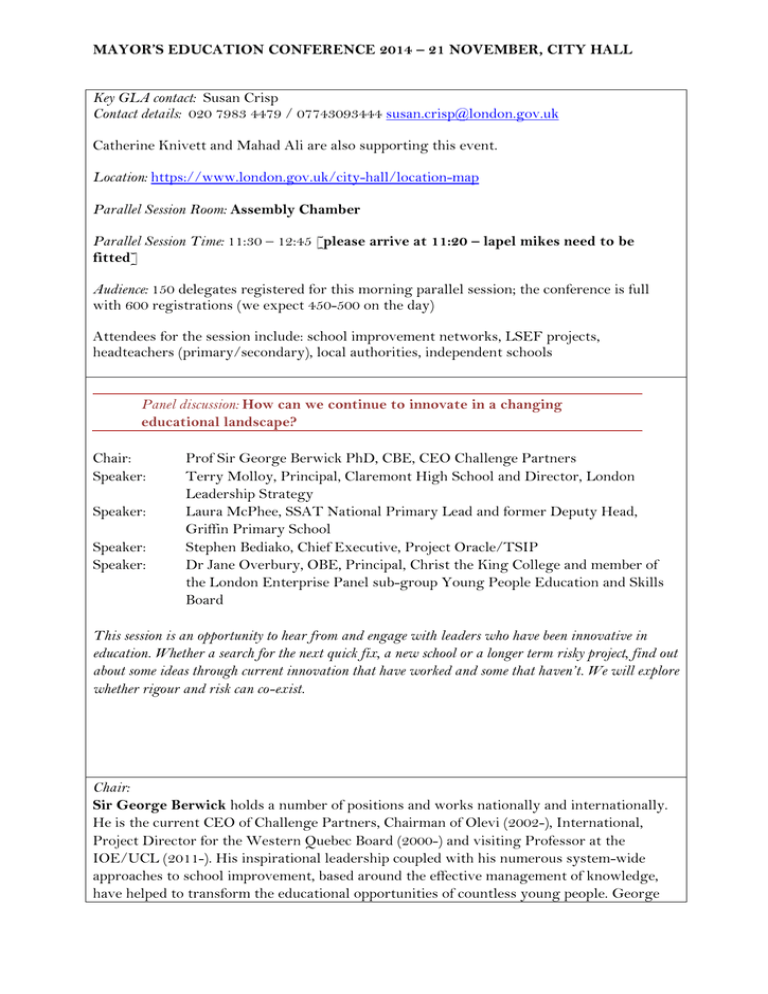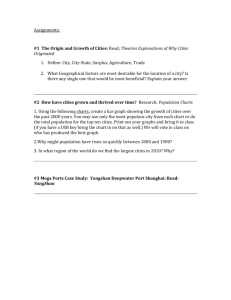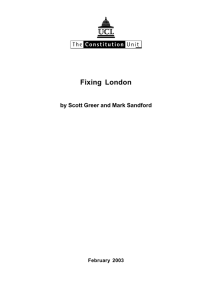NOVEMBER 22 2013 ANNUAL CONFERENCE TEMPLATE FOR
advertisement

MAYOR’S EDUCATION CONFERENCE 2014 – 21 NOVEMBER, CITY HALL Key GLA contact: Susan Crisp Contact details: 020 7983 4479 / 07743093444 susan.crisp@london.gov.uk Catherine Knivett and Mahad Ali are also supporting this event. Location: https://www.london.gov.uk/city-hall/location-map Parallel Session Room: Assembly Chamber Parallel Session Time: 11:30 – 12:45 [please arrive at 11:20 – lapel mikes need to be fitted] Audience: 150 delegates registered for this morning parallel session; the conference is full with 600 registrations (we expect 450-500 on the day) Attendees for the session include: school improvement networks, LSEF projects, headteachers (primary/secondary), local authorities, independent schools Panel discussion: How can we continue to innovate in a changing educational landscape? Chair: Speaker: Speaker: Speaker: Speaker: Prof Sir George Berwick PhD, CBE, CEO Challenge Partners Terry Molloy, Principal, Claremont High School and Director, London Leadership Strategy Laura McPhee, SSAT National Primary Lead and former Deputy Head, Griffin Primary School Stephen Bediako, Chief Executive, Project Oracle/TSIP Dr Jane Overbury, OBE, Principal, Christ the King College and member of the London Enterprise Panel sub-group Young People Education and Skills Board This session is an opportunity to hear from and engage with leaders who have been innovative in education. Whether a search for the next quick fix, a new school or a longer term risky project, find out about some ideas through current innovation that have worked and some that haven’t. We will explore whether rigour and risk can co-exist. Chair: Sir George Berwick holds a number of positions and works nationally and internationally. He is the current CEO of Challenge Partners, Chairman of Olevi (2002-), International, Project Director for the Western Quebec Board (2000-) and visiting Professor at the IOE/UCL (2011-). His inspirational leadership coupled with his numerous system-wide approaches to school improvement, based around the effective management of knowledge, have helped to transform the educational opportunities of countless young people. George MAYOR’S EDUCATION CONFERENCE 2014 – 21 NOVEMBER, CITY HALL has also contributed to the London Schools Excellence Fund as a member of the Expert Advisory Group. The EAG provided advise on which projects to fund, the approach to evaluation and importance of pro-active methods to support sharing learning between schools. Key speakers/discussants: Terry Molloy, Terry Molloy has had 36 years experience in education and during this time he has had a track record of being a successful teacher and leader in seven schools. He has been a Headteacher for the past 16 years. Terry was appointed Headteacher of Claremont High School in 1999, Claremont became one of the early Converter Academies in 2010 after the school was graded ‘Outstanding’ by HMI Ofsted. In 2015 the academy achieved outstanding in all categories in an Ofsted inspection. Terry is a Director of the London Leadership Strategy and in that capacity has been involved with the London Schools Excellence Fund helping to shape the support which LLS has provided to schools. Laura McPhee, has been involved with the London Schools Gold Club Award with Griffin Primary which was a Gold Club school in 2014-15. Now working for SSAT she is able to bring examples of schools from around England who are undertaking innovation. Laura is SSAT’s Head of Primary. The SSAT Primary National Executive Headteacher Network is for system leaders who hold strategic responsibility for more than one community of learning, and is intended to provide a peer network which offers support, guidance and inspiration. Stephen Bediako, Stephen is a leading figure in the drive towards an evidence-based approach to social programmes. He is the Founder and Managing Director of The Social Innovation Partnership (TSIP), a social advisory business that supports providers and commissioners to innovate, evaluate and understand the impact of their work. He also codirects Project Oracle, London’s children and youth evidence hub. Stephen worked with the GLA on the London Schools Excellence Fund, developing the theory of change and evaluation framework. Project Oracle has supported the projects to develop their own evaluations and complete robust self-evaluations. Project Oracle has a wider remit to support London’s children and youth sectors to establish better evaluation. Dr Jane Overbury, led a London Schools Excellence Fund project which brought state schools and sixth forms together with independent schools. A network has been established to encourage links between the sectors. Jane is also a member of the Young People Education and Skills Board, a London Enterprise Board sub-group. They recently produced the London Ambitions careers framework which was published by the LEP in June 2015 calling for 100 hours of careers opportunities for young Londoners. Session structure We have one hour and fifteen minutes for the session and would like speakers to provide short presentations to leave plenty of time for Q&A. This session is in the Assembly Chamber – this has two large screens for slides but it is not possible for the audience to read text or detailed charts. Please keep slides to a minimum and use them as illustrative ie photographs, simple charts. This session will be sound recorded. MAYOR’S EDUCATION CONFERENCE 2014 – 21 NOVEMBER, CITY HALL Presentation structure: The overarching theme for the conference is Leadership for London; looking at leadership at every level. This should be a theme running through the conference and through this session. We would also like this session to look at the topic from a London wide perspective as well as at the level of school to school and individual school. How can London Leaders continue to innovate in an educational and economic landscape that appears to favour quick wins and instantly measurable outcomes? Can rigour and risk co-exist? Building on the notion that innovation is what you do afresh with the best and boldest ideas to really make the difference to learners now and in the future, this session will allow delegates to hear what strategies other leaders have adopted to push the boundaries (as well as their limitations!), to consider where and how innovation is happening now, and to explore the potential for the future. Key themes for reflection and discussion, including the lessons learnt from the LSEF, Gold Club and London centric/national models for knowledge sharing and mobilisation, will include: • What in-house conditions and culture are needed to stimulate effective innovation, a dynamic cycle of innovation and consolidation, and how can we create them? • Balancing risk and rigour: How can schools use research and evaluation to shape and inform innovation? • Pushing the boundaries: What have we learnt from LSEF and linked developments about proven ways to share innovative practice within and across the system, and about creating sustainable models for sharing and replicating practice? • How can we continue to build resilient leaders (and enabling governance…)? " Proposed outline format for the session (in order of events): Chair: George brief introductory remarks, context & approach, reflection on title….. Please refer to recent Australia work as relevant; this brings a further international dimension to the conference. Introduce the Panel. (3 -5 mins max) Followed by tightly focussed presentations (5-7minutes each)- which touch briefly on the theme of innovation with consolidation/ sustainability; and which pick up, at least to some extent, on one of the key themes above in the order presented Jane to reflect on the in house conditions and culture from the perspective of her LSEF enabled cross sector initiative; (5-7minutes) Laura on building resilient leaders (Gold Club and her national role etc), importance of leadership, governance (5-7minutes) Q&A – related to topics /presentations Steve on the role of research and evaluation, and balancing risk & rigour; (5-7minutes) MAYOR’S EDUCATION CONFERENCE 2014 – 21 NOVEMBER, CITY HALL Terry on bullet 3 from both his school and a London centric /system wide approach to sharing innovative practice, some reflection on wider models- hubs, link to EEF families, diversity of "expert partners"- (5-7minutes) Also pick up and respond to/re-emphasise/link with the points made by preceding speakers. Q&A – related to topics /presentations This will probably take about 45 minutes. This leaves a further 30 minutes for wider discussion by the Panel and comments/questions from the audience Chair: Pulls out themes for further discussion and raises question/s to the Panel to kick this off. Concluding remarks: Chair can round off with 5 key things (actions/messages/pointers…) to take away which delegates might otherwise not have thought of. Outputs from the session- helping to answer these questions: - What are the challenges for London’s education? What innovation is needed? What are top tips to schools? What would be the next step that schools/system leaders want in London? Background Note London Schools Excellence Fund: LSEF has had significant reach across London with activity taking place in every London borough and projects building new partnerships and building expertise collaboratively with schools. Over 100 projects have reached 17,000 teachers in over 1,600 schools reaching about 680,000 pupils. Many of the projects are continuing and also working with schools outside London LSEF Evaluation: Projects have completed their self-evaluation reports and these are being reviewed by Project Oracle who are “validating” the evaluations. We expect most projects to reach Project Oracle Standard 2: A project that is validated at Standard 2 has undertaken an evaluation that measures relevant outcomes in an appropriate way, and has provided findings that indicate that the project has a demonstrable effect on those outcomes. Projects are encouraged to publish their own evaluations (on their websites) The programme evaluation will be published in February 2016. Speakers in this session will speak about their own projects and their perspective on the LSEF programme. Placing this into a wider context. Early insights Several projects have used lesson study approaches. These have focused on different subjects and different aspects of learning. MAYOR’S EDUCATION CONFERENCE 2014 – 21 NOVEMBER, CITY HALL Involving teachers throughout the programme is empowering. Links to day-to-day practice are welcomed. To get the most out of better subject knowledge, teachers should also improve their pedagogical skills. For external expert support to work there needs to be a bridge between ‘subject knowledge’ and ‘classroom practice’. Teacher knowledge should be assessed at the start of professional development. The LSEF projects offer some good examples on how to do this. It’s also important to look at the difference between ‘confidence and competence’. Learning by doing offers huge benefits. One example is HEI and Subject Association experts working with teachers to develop resources. Professional development and learning can motivate teachers. It can also make teachers more like stay in the profession. Also being published on the day of the conference: 1. Education Annual Report which provides an overview of education at each key stage. This includes early years and key stage 5. London continues to do well across all areas. Key stage 5 is the area where London does less well. A session at the conference will look at the report and issues for the future. 2. Report by GLA Intelligence Projected Demand for School Places on school age population and demand for school places 2015 – 2025. The key data from this is included in the annual report. 3. School survey by BMG Investigating the school improvement needs and practices of London primary and secondary schools. This is currently underway. 4. Report on school leadership and the prospective shortage of school leaders Building the Leadership Pool in London Schools, based on data and surveys of school leaders. Key data is included in the annual report. Tackling this is the focus for a separate parallel session at the conference. Room set up/ICT requirements to flag up? There will be a stage, lectern, tub chairs for the panel and low table. Everyone will need lapel mikes – the AV Company will do this. If you are going to use PowerPoint please submit to Susan by Wednesday 25 November using the standard ‘conference’ template (attached) Please bring a USB on the day as back up. Please ensure slides are kept to a minimum if you are using them. We have a PowerPoint template available. There will be an official photographer and a film-maker with us on the day and either/both may well pop into the room at some point to capture the session. We also plan to audio record the session, to help write it up and make available to delegates or others not able to make this session. Conference purpose School improvement in London requires schools to work together, and with the wider MAYOR’S EDUCATION CONFERENCE 2014 – 21 NOVEMBER, CITY HALL school system and cultural, business and third sector partners, and to demonstrate impact in their pupils’ attainment and prospects. The Mayor’s Education Conference will bring London headteachers and senior school leaders together with global experts. The aim is to celebrate our educational successes and share great ideas that really work. The conference will ensure senior leaders across London schools hear of the progress in the GLA education programme delivery and the opportunities for them to engage.





